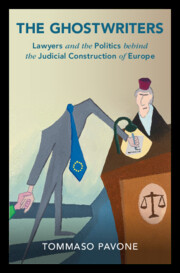‘This is a remarkable [book], both in terms of theory development, research design, scope, and style. Besides rewriting the history of European legal integration, The Ghostwriters also makes important contributions to theories of legal mobilization and political lawyering beyond the European Union. Pavone builds his narrative on a set of carefully selected case studies and on a wide variety of data and methods, including archival studies, geospatial analysis and more than 350 interviews in Italy, France, and Germany … The narrative is so persuasive because the judges and lawyers can speak directly to the reader.’
Source: Award Committee for the 2020 Edward S. Corwin Award from the American Political Science Association
‘… Pavone advances an alternative narrative of the actors behind the institutionalization of European law: entrepreneurial lawyers as opposed to ‘activist judges’ or courts were the motors of European legal integration … [The Ghostwriters] makes both empirical and theoretical contributions, especially when it comes to understanding transnational legal change. It is written in a compelling manner, weaving theory building with data analysis … [Pavone's] writing style is both accessible and allows the reader to imagine herself in the spaces where he conducted his research, in true ethnographic style.’
Source: Award Committee for the 2020 Dissertation Prize from the Law & Society Association
‘Pavone has a unique talent to take us into a fascinating (if sobering) journey exploring the uneven ‘lawscape’ of the European Union. Elegantly written, analytically sophisticated and empirically novel, The Ghostwriters reveals an entirely new geography of EU law and delineates a grounded theory of EU legal integration. A great piece of scholarship!’
Antoine Vauchez - CNRS Research Professor at the Université Paris 1-Sorbonne, and author of Brokering Europe. Euro-lawyers and the Making of a Transnational Polity (Cambridge University Press, 2015)
‘This book directly challenges two decades of research that has focused on the role that judges have played in the legal construction of the European Union. Beautifully written, theoretically important, methodologically innovative and empirically robust, The Ghostwriters will be of interest to scholars of EU politics and law, judicial politics, socio-legal studies and those relying on historical institutionalist approaches across political science.’
Lisa Vanhala - Professor of Political Science at University College London, and author of Making Rights a Reality? Disability Rights Activists and Legal Mobilization (Cambridge University Press, 2011)
‘In The Ghostwriters, Tommaso Pavone shows that European Union law grew from litigation by radically creative lawyers who, having lived the horrors of world war, sought a brighter future through economic and cultural exchange. Resting on an elegant research design and extraordinarily rich data including ethnographic observations, interviews, case studies, and geo-coded litigation data, this profoundly important book demonstrates that law is local and deeply personal, even when building a transnational economic union. A stunning achievement.’
Charles Epp - University Distinguished Professor at the University of Kansas, and author of The Rights Revolution (University of Chicago Press, 1998)
‘Pavone has written a tour de force that will stand the test of time. Drawing on hundreds of interviews, this book changes our understanding of the institutionalization of European law and transnational legal change. This book has it all: Innovative theory, broad and compelling data analysis, and interesting, important, and surprising conclusions. It is a true must-read for those interested in judicial politics, European politics, and law and society.’
Michael Nelson - Professor of Political Science, Pennsylvania State University
‘The Ghostwriters provides a refreshing and compelling account of how the European Court of Justice (ECJ) has become a powerful supranational court thanks to the relentless efforts of dedicated lawyers. Pavone counters the long-held presumption that national court judges were the heroes behind Europe’s legal integration. Using an impressive research design and rich data, the book demonstrates that the driving force behind Europe’s new international legal order were the lawyers who recruited litigants, educated judges, and even ‘ghostwrote’ referrals to the ECJ. Pavone offers an innovative analysis of the ideational and strategic factors that motivate legal professionals without losing sight of their institutional constraints and the broader political environments they are embedded in. By advancing our understanding of the politics of lawyers and court-driven political change, this timely book makes important contributions to comparative political development, legal mobilization, and judicialization.’
Filiz Kahraman - Assistant Professor in Political Science, University of Toronto
‘The Ghostwriters is a profoundly revisionist, deeply researched, and beautifully written account of how a far-flung collection of ‘Euro-lawyers’ pioneered and powered the development of European Union law. In it, Tommaso Pavone confronts and falsifies the ‘founding myth’ of a European legal process driven by rights-conscious litigants and activist judges, marshalling a mountain of diverse evidence to chronicle how private lawyers prodded reluctant national judges to engage with the European Court of Justice and construct the rule of European law. Theoretically creative, methodologically rigorous, and compulsively readable, it is the most important book on European legal integration in decades.’
Mark Pollack - Professor of Political Science and Law and Jean Monnet Chair, Temple University
‘By casting light on agents of social change whom scholars have largely neglected to date, Pavone makes a significant contribution to the socio-legal scholarship on the construction of the European Union.’
Florian Grisel
Source: Centre for Socio-Legal Studies
‘[This] book dispels the often-taken-for-granted assumption that … national courts assist the ECJ on their own initiative. It supports it on extremely complex empirical data from geocoded data on submission activity over time as well as from vast amounts of qualitative information, including new ones accessible historical trial files, hundreds of interviews and field research in Italy, France and Germany.’
Henning Deters
Source: Politische Vierteljahresschrift



